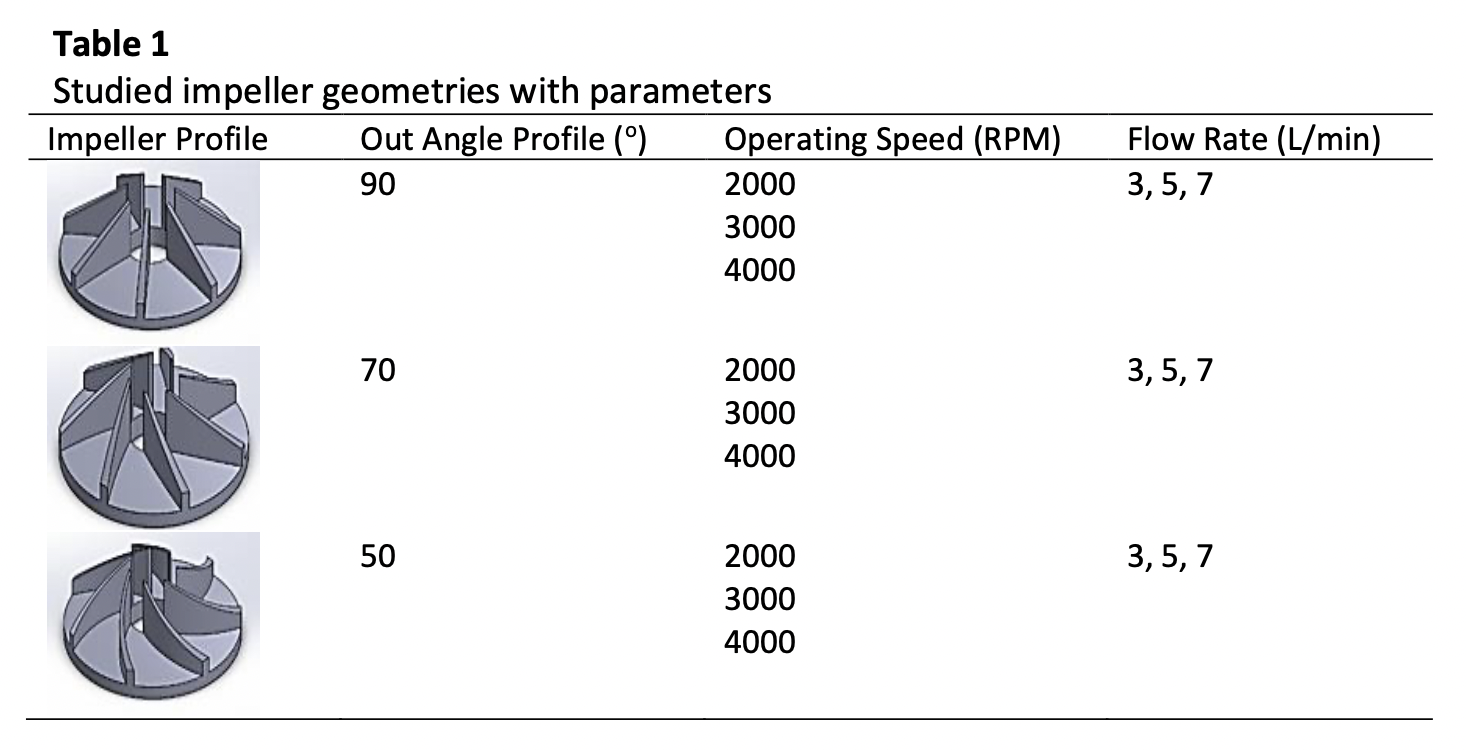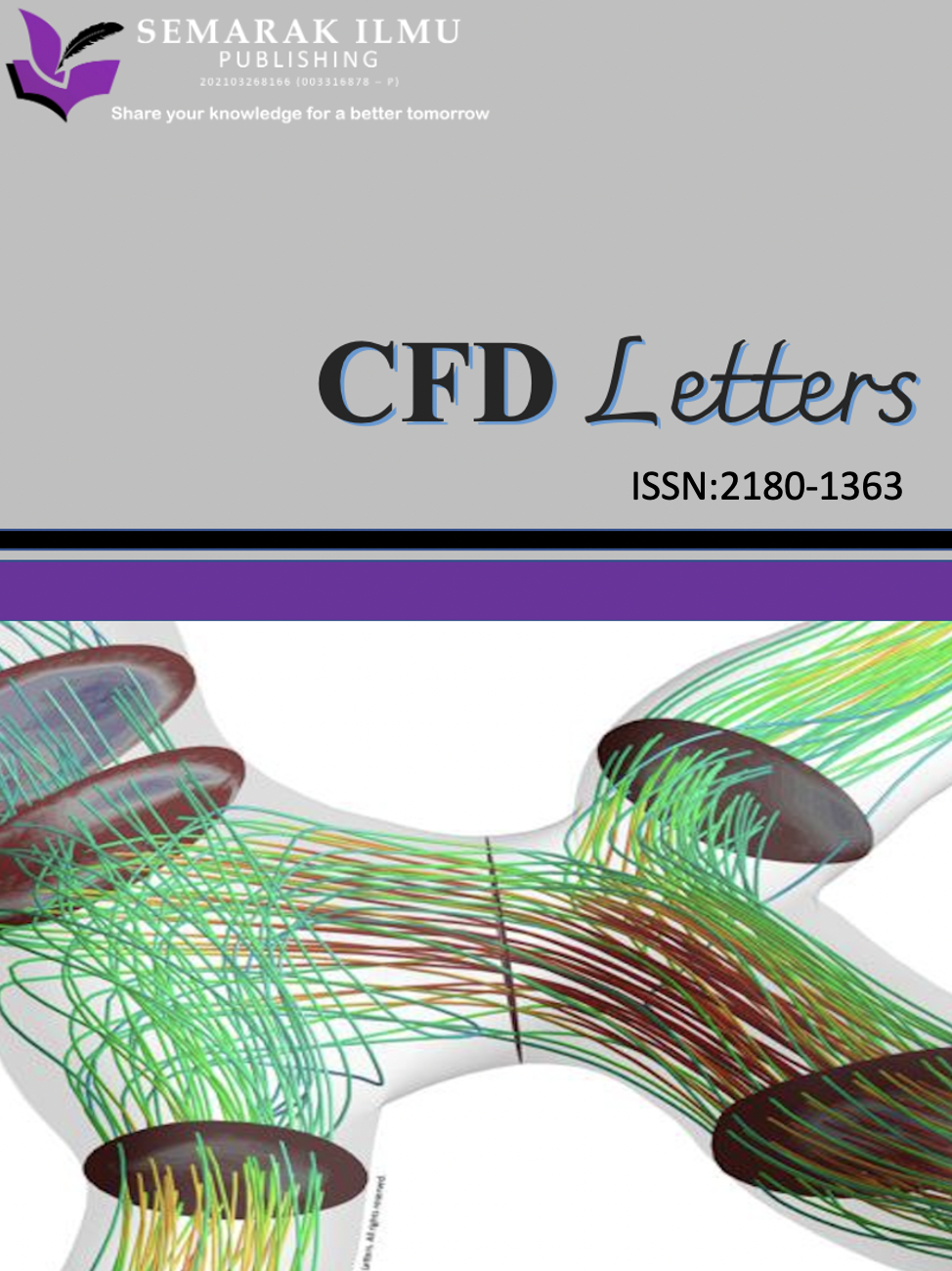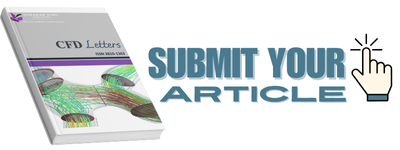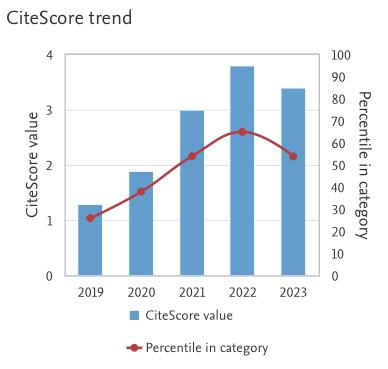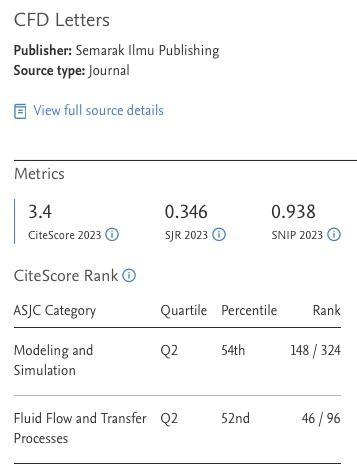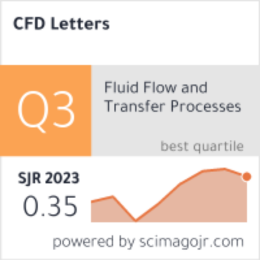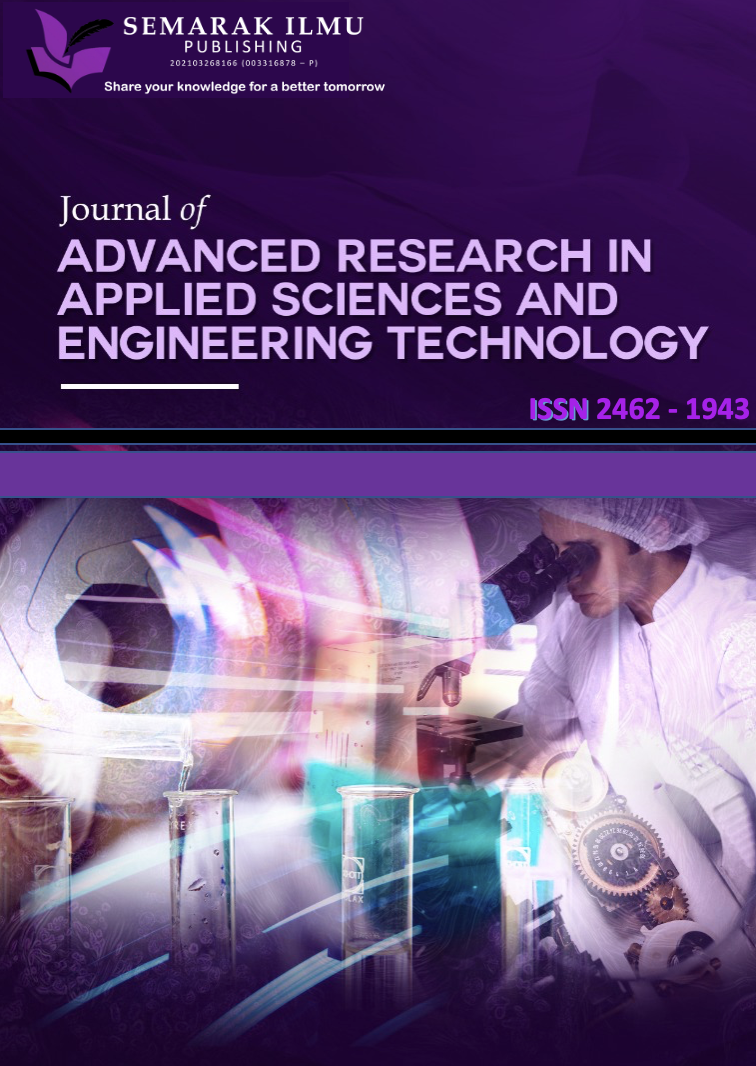Analysis of Flow Characteristics for Different Blade Outlet Angle in LVAD
DOI:
https://doi.org/10.37934/cfdl.15.11.7991Keywords:
Left Ventricular Assist Device, Numerical Simulation, Impeller blade angle, Pressure, EfficiencyAbstract
Mechanical heart assist device is an emerging treatment for end stage of heart failure which is an alternative to heart transplant due the shortage of heart donors. Despite the clinical success of Left Ventricular Assist Devices (LVAD), the development still continue as new designs are progressively being tested to address the ever existing complications. Developing centrifugal blood pumps requires determination between adequate pump performance while giving attention to possible occurrence of blood clot and damage. This study utilized a proposed design concept of different impeller angle geometry and evaluate its merits of adapting the concept from a perspective of computational fluid dynamic (CFD) approach. Theoretically, two types of impeller angle design feature were chosen for this study, the radial type 90° and backward facing type (50° and 70°) impellers of the blood pump to provide data on both the flow characteristics and pressure distribution of the blood pump (LVAD). Three model variations were constructed from the design parameters for comparison with experimental data. Shear Stress Transport (SST) turbulent model under steady state analysis was used to simulate 3 impeller blade angles with initial boundary setup was known for operating speed and flowrates. Evaluation involved assessing the model variants based on several performance criteria. Ranked selection method was used to rate and select the best performing model variation with a good compromise between the pressure head produced and the percentage of hydraulic efficiency as output level among the geometries. CFD results showed that impeller with blade outlet angle of 50° has the most efficient blood pump configuration among the three types of impeller blades. Pressure gradient drop for this impeller angle is the lowest compared with 90° and 70°. Ranking and selection of the model variants resulted in the backward facing 50° impeller blade ranked as the best performing configuration that gives the good compromise of pump performance setup.
Downloads
References
Sawyer, Douglas B., and Ramachandran S. Vasan. Encyclopedia of Cardiovascular Research and Medicine. Elsevier, 2017.
Porepa, Liane F., and Randall C. Starling. "Destination therapy with left ventricular assist devices: for whom and when?." Canadian Journal of Cardiology 30, no. 3 (2014): 296-303. https://doi.org/10.1016/j.cjca.2013.12.017
Adler, Adam C., Kelly L. Grogan, and Laura K. Berenstain. "Mechanical circulatory support." In A Practice of Anesthesia for Infants and Children, pp. 500-519. Elsevier, 2019. https://doi.org/10.1016/B978-0-323-42974-0.00021-5
Marinova, Valeria, Iman Kerroumi, Andreas Lintermann, Jens Henrik Göbbert, Charles Moulinec, Sebastian Rible, Yvan Fournier, and Mehdi Behbahani. "Numerical analysis of the FDA centrifugal blood pump." In NIC Symposium, vol. 48, pp. 355-364. 2016.
Whitaker, Robert H. "Anatomy of the heart." Medicine 46, no. 8 (2018): 423-426. https://doi.org/10.1016/j.mpmed.2018.05.010
Ikwuagwu, Linda. "Anatomy of the Human Heart." ACLS Training Center. March 12, 2016. https://www.acls.net/anatomy-of-the-human-heart.
SEER. "Structure of the Heart." National Cancer Institute, SEER Training Modules. Accessed December 2, 2018. https://training.seer.cancer.gov/anatomy/cardiovascular/heart/structure.html.
Guyton, Arthur C., and John E. Hall. Text book of medical physiology. Elsevier, 2006.
Bailey, Regina. "The Cardiac Cycle." ThoughtCo. November 11, 2019. https://www.thoughtco.com/phases-of-the-cardiac-cycle-anatomy-373240.
Ahmad, Miraj. "Cardiac Cycle, Phases of Cardiac Cycle, Cardiac Cycle & ECG." Medicosite. April 10, 2018. https://www.medicosite.com/cardiac-cycle/.
Lumen Learning. "Cardiac Cycle." Lumen Learning. Accessed December 2, 2018. https://courses.lumenlearning.com/suny-ap2/chapter/cardiac-cycle/.
Pollock, J. D., and A. N. Makaryus. Physiology, Cardiovascular Hemodynamics. StatPearls, 2018.
Secomb, Timothy W. "Hemodynamics." Comprehensive Physiology 6, no. 2 (2016): 975. https://doi.org/10.1002/cphy.c150038
Munson, Bruce R., Donald F. Young, Theodore H. Okiishi, and Wade W. Huebsch. Fundamentals of fluid mechanics. Sixth ed. John Wiley & Sons, 2009.
Carter, B. "Go with the flow." Innovations in Pharmaceutical Technology 54 (2015): 36-39.
Hosseinipour, Milad, Rajesh Gupta, Mark Bonnell, and Mohammad Elahinia. "Rotary mechanical circulatory support systems." Journal of Rehabilitation and Assistive Technologies Engineering 4 (2017): 2055668317725994. https://doi.org/10.1177/2055668317725994
National Heart, Lung, and Blood Institute. "Ventricular Assist Device." National Heart, Lung, and Blood Institute (NIH). Accessed December 3, 2018. https://www.nhlbi.nih.gov/health-topics/ventricular-assist-device.
Starrh, Laura, and Deborah Becker. "Ventricular assist devices: The basics." The Journal for Nurse Practitioners 14, no. 7 (2018): 538-544. https://doi.org/10.1016/j.nurpra.2018.05.001
Grand View Research. " Congestive Heart Failure Treatment Devices Market Size, Share & Trends Analysis Report By Product (Ventricular Assist Devices, Counter Pulsation Devices, Implantable Cardioverter Defibrillators, Pacemakers) And Segment Forecasts to 2016 – 2024." Grand View Research, 2016. https://www.grandviewresearch.com/industry-analysis/congestive-heart-failure-treatment-devices-market
Lee, P. "Left Ventricular Assist Device (LVAD) and Circulatory Devices in Heart Failure." Reference Module in Biomedical Sciences (2018). https://doi.org/10.1016/B978-0-12-801238-3.99664-8
Pasha Zanous, Sina, Rouzbeh Shafaghat, and Qadir Esmaili. "Numerical investigation of the hydrodynamic parameters of blood flow through stenotic descending aorta." Proceedings of the Institution of Mechanical Engineers, Part H: Journal of Engineering in Medicine 229, no. 7 (2015): 524-534. https://doi.org/10.1177/0954411915588574
Kafagy, Dhyaa, and Horizon Gitano-Briggs. "Axial Flow Artificial Heart Blood Pumps: A Brief Review." Trends in Biomaterials & Artificial Organs 27, no. 3 (2013): 124-130.
Fraser Jr, Charles D., Kathleen E. Carberry, W. Richard Owens, Karol A. Arrington, David LS Morales, Jeffery S. Heinle, and E. Dean McKenzie. "Preliminary experience with the MicroMed DeBakey pediatric ventricular assist device." In Seminars in Thoracic and Cardiovascular Surgery: Pediatric Cardiac Surgery Annual, vol. 9, no. 1, pp. 109-114. WB Saunders, 2006. https://doi.org/10.1053/j.pcsu.2006.02.016
Fan, Hui-min, Fang-wen Hong, Lian-di Zhou, Yin-sheng Chen, Liang Ye, and Zhong-min Liu. "Design of implantable axial-flow blood pump and numerical studies on its performance." Journal of Hydrodynamics 21, no. 4 (2009): 445-452. https://doi.org/10.1016/S1001-6058(08)60170-5
Shi, Yubing, and Theodosios Korakianitis. "Impeller-pump model derived from conservation laws applied to the simulation of the cardiovascular system coupled to heart-assist pumps." Computers in Biology and Medicine 93 (2018): 127-138. https://doi.org/10.1016/j.compbiomed.2017.12.012
Bozkurt, Selim, and Koray K. Safak. "Evaluating the hemodynamical response of a cardiovascular system under support of a continuous flow left ventricular assist device via numerical modeling and simulations." Computational and Mathematical Methods in Medicine 2013 (2013). https://doi.org/10.1155/2013/986430
Stanfield, J. Ryan, Richard K. Wampler, Jingchun Wu, James Stewart, Trevor A. Snyder, and James W. Long. "Design of a miniature pump for chronic mechanical circulatory support using computational fluid dynamics and flow visualization." In Frontiers in Biomedical Devices, vol. 40672, p. V001T01A007. American Society of Mechanical Engineers, 2017. https://doi.org/10.1115/DMD2017-3422
Han, Xiangdong, Yong Kang, Deng Li, and Weiguo Zhao. "Impeller optimized design of the centrifugal pump: A numerical and experimental investigation." Energies 11, no. 6 (2018): 1444. https://doi.org/10.3390/en11061444
Kadir, Muhammad Rashidi Abdul. "Numerical Investigation Of Impeller Design Variation On Mechanical Blood Pump Hemodynamics." PhD diss., Universiti Teknologi Malaysia, 2017.
Moazami, Nader, Kiyotaka Fukamachi, Mariko Kobayashi, Nicholas G. Smedira, Katherine J. Hoercher, Alex Massiello, Sangjin Lee, David J. Horvath, and Randall C. Starling. "Axial and centrifugal continuous-flow rotary pumps: a translation from pump mechanics to clinical practice." The Journal of Heart and Lung Transplantation 32, no. 1 (2013): 1-11. https://doi.org/10.1016/j.healun.2012.10.001
ANSYS. "ANSYS CFX Tutorials 16.0." ANSYS Inc., 2015.
Song, Guoliang, Leok Poh Chua, and Tau Meng Lim. "Numerical study of a centrifugal blood pump with different impeller profiles." ASAIO Journal 56, no. 1 (2010): 24-29. https://doi.org/10.1097/MAT.0b013e3181c8f066
Hilton, Andrew. "Proposal for a cost-effective centrifugal rotary blood pump: design of a hybrid magnetic/hydrodynamic bearing." PhD diss., University of Nottingham, 2010.
Lin, Changyan, Guanghui Wu, Xiujian Liu, Chuangye Xu, Xiaotong Hou, Haiyang Li, Chen Chen, Peng Yang, Jing Wang, and Yuyang Liu. "In vivo evaluation of an implantable magnetic suspending left ventricular assist device." The International Journal of Artificial Organs 38, no. 3 (2015): 138-145. https://doi.org/10.5301/IJAO.2015.14486

